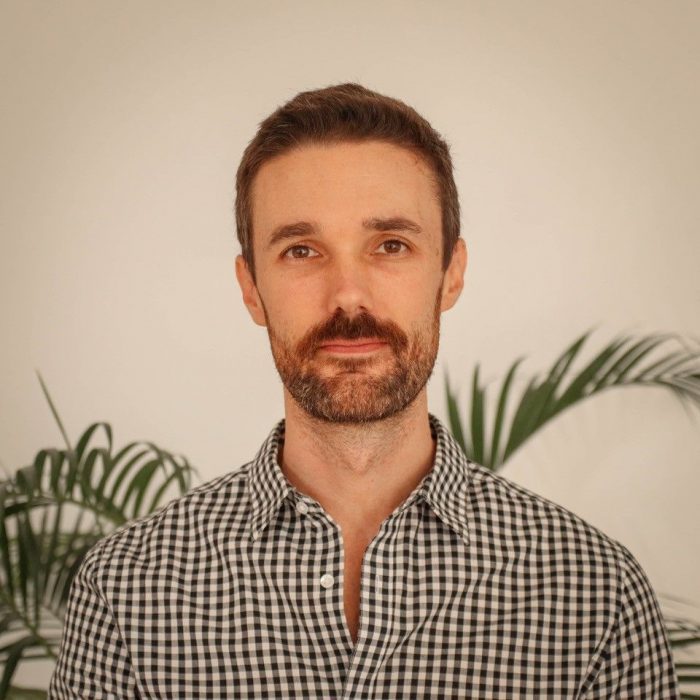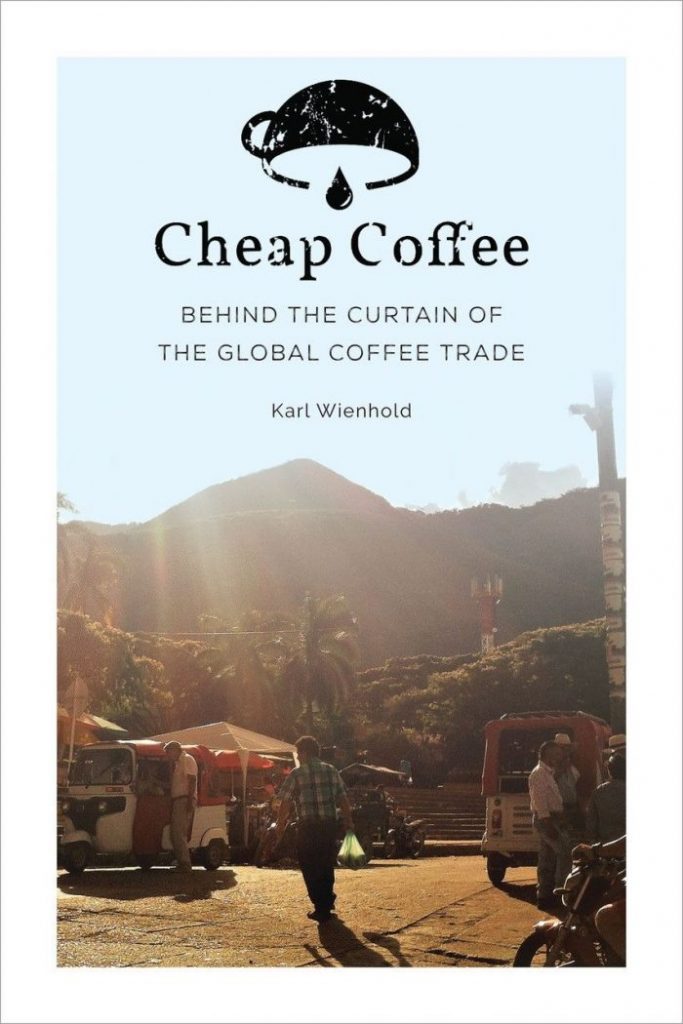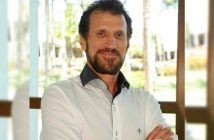Written by American born and Colombian born of heart, Karl Wienhold, the book reveals absolute truths within the green coffee chain
Released in April, in the USA, by Roast Magazine (and without translation to Portuguese yet), the book Cheap Coffee Book – Behind the Curtains of the Global Coffee Trade -, is a result of a serious academic search work about all connection in the chain and decodes in a simple and fluent way, which is the responsibility of each one in maintenance of the status quo so unequal of coffee chain, it can be consumers, producers, roaster, coffee specialist, coffee shop owner, retail chains, traders, intermediaries, shareholders of the large companies in the sector, etc.
“If we want to perpetuate coffee production around the world it will be necessary to have an adult discussion about the issue. There aren’t good guys or bad boys how people generally think”, said Karl.
Read below the exclusive interview we did with the author, Karl Wienhold.

Grão Especial – You are American born, but consider yourself a Colombian of heart, right?
Karl Wienholf – Yes, I was born in the state of Maryland in the USA. But I have been out of there almost all my adult life. I finished my degree in Economics and then went to Brazil to do an MBA in Business at the Federal University of Rio de Janeiro (UFRJ), where I lived for nine months. Then I went to Colombia and fell in love with the country.
Grão Especial – and in Brazil, which coffee entered in your life?
Karl Wienholf – Yes, I had a friend at UFRJ, from Minas Gerais, who took me to visit his farm in the south of Minas. Afterwards, I did some consulting work in Betim, in some countries in Europe, Asia, Central America.
Grão Especial – and in Colombia?
Karl Wienholf – In Colombia, I was doing rural development projects to help the indigenous people in the interior of the country, studying the whole value chain. I studied coffee, fruits, typical foods, from small producers, and how to introduce these products in rich countries.
Grão Especial – And did you work for the other side as well?
Karl Wienholf – Yes, I worked for big players, for Foundations, for the Government.
Grão Especial – When did you change your worldview?
Karl Wienholf – In 2014, I started helping small coffee producers, I went to live in Bogotá, then I went to Pereira, a region full of small farms producing special coffees, distant about 10 hours by car from Bogotá. There, I set up a company called Cedro Alto, in which about 250 small producers of special coffee participate. The aim is exporting this coffee together.
Grão Especial – What exactly do you do for the lives of these producers?
Karl Wienholf – They must sell these coffees to middlemen, to multinationals, at market price. In Colombia, there are almost no government incentives to produce a better-quality coffee. In direct trade, the producer can export to a roaster, but for the small ones, it is impossible. I created Cedro Alto, a collective group so that the small ones can have the same opportunity to export directly to the roasters, at prices higher than the market and constant.
Grão Especial – All these 250 producers produce special coffee?
Karl Wienholf – Yes, All of them!
Grão Especial – What has changed in the lives of these producers since you created Cedro Alto, about seven years ago?
Karl Wienholf – They have less worry. They usually have to pay for a lot of things, invest, without knowing the selling price, and this is a stress. With us, they don’t have this worry, we already have buyers established in the USA and Australia, who assure the producers a higher and constant price.
Grão Especial – Would you say that the particular life of these 250 Colombian producers has improved?
Karl Wienholf – I think so. Now they have bathrooms, beds, pets, things they couldn’t have before. The truth is that many of them are not good at family economics, at how to manage their money, but this is no longer my job.
Grão Especial – Did all this experience help in the development of your book?
Karl Wienholf – Not so much. In my book I deal with global issues of the green coffee value chain. About the work of all the links, about what an exporter, a producer, a middleman, and a retailer have done. So that everyone can understand better the work of others, the economics of this immense chain. And they can be more empathetic with one another. Everyone has a mission to accomplish!
Grão Especial – What is the public for your book?
Karl Wienholf – This book was written thinking of all the people who work in the coffee chain. Governments, exporters, importers, coffee growers, it is very broad, so that everyone can understand what the work of others is like. To build more empathy. When I talk separately to these audiences, we talk about the major problems of the chain. However, I realize that we only talk about the major symptoms. But the problems are not solved. And if you ask whose the blame is, my answer is that there is no single guilty. We are all part of the problem. And that is what my book is about: how things work behind the curtains.
Grão Especial – In your opinion, is there any most important aspect that is highlighted in the book?
Karl Wienholf – This is not a traditional book, it is much more in the style of an encyclopedia, I deal with numerous subjects. The topics were selected because over seven years I have talked to the different links in the chain, and I realized that there was a great lack of understanding about the work of the other parties involved. Because it is true that we need to change reality. But what really needs to change? And if we just complain, there is no time left to solve the issues. And if people just blame the other links in the chain as the only ones responsible for the economic distortions in this market, nothing will be solved.
It took me a little over three years. Two years I spent researching, reading five thousand pages of scientific research, trying to keep my beliefs out of the equation so I could translate the topics into an accessible book. Then another six months writing and a year to publish it.
The most important thing in the book is for the reader to understand that there are many more nuances to this market than the public tends to believe. There are no good guys and bad guys. There is no black and white! And knowing the market beyond the stereotypes is important for the own consumers ask themselves how to consume better.
There is a general belief that coffee farmers are good people, are being abused, and need to be saved, because after all, they are poor people. And I, being a great person, will save them, simply by paying a dollar more for their coffee. Unfortunately, it is not that simple. Neither all farmers are good people, there are good and bad people, but they don’t have to wear their old clothes either. I think that these misconceptions are distractions, which don’t let us solve what really needs to be solved.
Grão Especial – Explain a little about the topic of symbolic values and real values that is in the book.
Karl Wienholf – I think this is perhaps one of the most controversial chapters of the book. Imagine the situation: a coffee from a certain small producer arrives at the roaster. Someone said that it is necessary to put a package with the face of the producer and tell a very sad story to sell it better. Bu the way, how much more sad, better. And this is pure manipulation! It is just the market, not reality! Once, we worked with a producer who was a single mother. Her coffee was very good, but no better than the others. It was the fastest seller. Do you know why? Because they told a very sad story about her life. The consumer loves this. But it’s not true. It is manipulation, you know? Another small farmer in Colombia had a very good coffee. But he had a wife, children, was not addicted to drugs, in other words, no great misfortunes or catastrophes along his path. And the consumer was not sensitive enough to buy his little packets of coffee.
Want another example of mystification? People buy a Gueixa from Panama, with a score of 87 on the SCA scale, and pay more than a microlot Caturra from Colombia, with an equivalent or higher score. What does this demonstrate? That the market is totally irrational. That we are influenced more by symbolic values than by material values. It doesn’t make any sense. And when people realize it, they see the lack of sense and feel embarrassed.
Grão Especial – In other words, it is much easier to choose one side of the story.
Karl Wienhold – Exactly! It is easier to choose one side of the story. However, we have some rules in our heads. But everyone is different, and you must think about the topics much more deeply. At the risk of this market becoming even more unfair.
Grão Especial – How do you see the coffee market in the next 10 years?
Karl Wienhold – I didn’t deal with this in my book. But I am extremely concerned about the concentration in the coffee chain. It is worrisome because it affects the bargaining power of the producer. In this market, everyone can be replaced, even the countries that today have the largest productions in the world, such as Brazil and Vietnam. The major climate changes may also affect the chain irreversibly in the next 20, 30 years.
book: Cheap Coffee Book – A look behind the curtain of the Global Coffee Trade

Autor: Karl Wienhold
Pages: 248
Price: U$ 14, 95 in paper and U$ 9,95 in the digital shape
Publisher: www.roastmagazine.com



